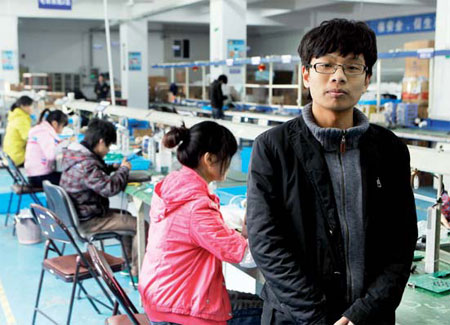Cash crunch delivers a knock-out blow
Updated: 2012-01-06 08:53
By Andrew Moody and Hu Haiyan (China Daily)
|
||||||||
|
Huang Yongda, vice-director of Make Power, a microelectronic technology research company. Yong Kai / for China Daily |
Jin Zhimian is a small business owner who has been hit hard by the funding crisis in Wenzhou.
The 31-year-old president of Wenzhou Jinkang has had to lay off nearly half of his workforce over the past year.
He started out with 30 employees at the beginning of 2011 and now this is down to 18. He used to employ 50 people in 2007 before the onset of the global downturn.
"I have had to lay off my factory manager and now also my driver. I am now my own driver. You can see how bleak the situation is," he says.
Jin, who was speaking in the private room of a restaurant away from his factory, says many businesses were worried that private money lenders would come knocking on their doors to settle outstanding loans before the Chinese New Year.
"When I came here I passed by another business near mine where there were several police cars outside the factory gates. I got the impression it was another case of a boss fleeing the country leaving behind unpaid debts," he says.
A manager of a manufacturing business, who wished to remain anonymous, insists local banks are not helping the situation.
He borrowed 100,000 yuan ($15,880, 12,183 euros) from a Zhejiang bank for working capital last year and despite paying the money, has been refused another loan recently.
"I went to the same bank and they just said no. It was the same amount as last year. The money would be secured on plant and machinery and I need the funds to pay wages. I just don't know what to do. I don't want to go to the underground moneylenders," he says.
Jin at Wenzhou Jinkang says most of the private moneylenders are now entrepreneurs like him who are looking for a better return on their money.
"Three or four years ago a number of the moneylenders used to be gangsters but now they are mostly business people," he says.
He insists, however, there are extreme elements that do not shy away from using hard tactics to get their money back.
"Some resort to ransom. I know someone who had his uncle kidnapped in order to recover the money," he says.
Make Power, a microelectronic technology research company, is the type of high-tech business the local government is trying to encourage - it employs 200 at the Wenzhou High-tech Park on the outskirts of the city.
Its 32-year-old vice-director Huang Yongda says while there has been no difficulty in getting money from the banks, it has become a lengthier process.
"It used to take about two weeks to process a loan but now it takes a month. This has some effect on us but we just have to absorb it," he says.
"We wouldn't consider the moneylenders since the procedure is not only troublesome but they only offer small scale capital. We want significant capital to expand our business and our track record is very good."
Louis Lu, president of Sanshan Optics, a Wenzhou maker of top-of-the-range designer sunglasses, insists businesses operating in the higher-end sectors of the market have the least funding issues.
The company, which was founded in 1999 and has 1,800 employees, had sales of 180 million yuan last year and tends to operate on six-month loan facilities.
"Those companies that mainly produce low value-added products are likely to suffer more problems as a result of this credit crisis," he says.
"We mainly produce high-end glasses and have a good cash flow and don't have any problem in getting bank loans and paying back the debt."
For others, however, things are more anxious. Jin at Wenzhou Jinkang says as the Chinese New Year approaches there is a bad atmosphere and a lack of trust between companies and their clients.
"People have this feeling that if they manufacture an order for someone, the client might collapse and they won't get paid. It is not a good situation."

 Relief reaches isolated village
Relief reaches isolated village
 Rainfall poses new threats to quake-hit region
Rainfall poses new threats to quake-hit region
 Funerals begin for Boston bombing victims
Funerals begin for Boston bombing victims
 Quake takeaway from China's Air Force
Quake takeaway from China's Air Force
 Obama celebrates young inventors at science fair
Obama celebrates young inventors at science fair
 Earth Day marked around the world
Earth Day marked around the world
 Volunteer team helping students find sense of normalcy
Volunteer team helping students find sense of normalcy
 Ethnic groups quick to join rescue efforts
Ethnic groups quick to join rescue efforts
Most Viewed
Editor's Picks

|

|

|

|

|

|
Today's Top News
Chinese fleet drives out Japan's boats from Diaoyu
Health new priority for quake zone
Inspired by Guan, more Chinese pick up golf
Russia criticizes US reports on human rights
China, ROK criticize visits to shrine
Sino-US shared interests emphasized
China 'aims to share its dream with world'
Chinese president appoints 5 new ambassadors
US Weekly

|

|







